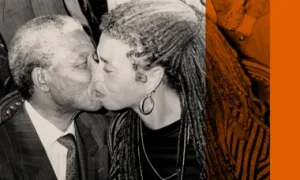Angela Davies was 79 last Friday and Boston Review did not forget to mark the birthday but by intellectualizing her, a package to which the piece below served as a kind of preface. Of course, there are all manner of stuff on her but readers hungry for more on her can either check Boston Review or previous stuff, especially the one by the UK based The Guardian in March 222. She remains the pioneer’s pioneer across philosophy, theorizing, what is now critical race theory and praxis, feminist protestation, and escaping imprisonment because of lack of evidence to convict her and what have you!
 An old but too significant a picture – Nelson Mandela and Angela Davies. Unfortunately, it is a big battle on the internet to get a better version of it Few thinkers have fused theory and practice like Angela Davis. For decades the legendary organizer, intellectual, and former political prisoner has advanced a revolutionary anti-racist, anti-fascist politics of liberation. As she celebrates her seventy-ninth birthday this month, her struggle for a better world remains urgent. For philosopher Alberto Toscano, the enduring value of Davis’s thought is manifest in her distinctive analysis of U.S. fascism, which she developed in the early 1970s by drawing on Herbert Marcuse’s concept of “preventive counter-revolution.” According to Toscano, by moving away from a Eurocentric definition and emphasizing the role of the prison in the United States, Davis’s conception of fascism “can serve as an antidote to the lures and limits of the analogies that increasingly circulate” in today’s debates about the term’s meaning.  Another face of Angela Davies Davis’s political and philosophical interventions in the struggle for reproductive justice also continue to resonate. As women and gender studies scholar Sara Matthiesen argues, Davis’s 1981 essay “Racism, Birth Control, and Reproductive Rights” reminds us that reproductive choice cannot be separated from broader concerns about race, class, and gender oppression. “It is crucial we foreground Davis’s insight about the harmful effects of exploitative systems on intimate life,” Matthiesen writes. While there is no question that the right to abortion must be ensured, “we must also ask how much choice the families Davis was most concerned with have had since Roe v. Wade, and contemplate the ways that vast inequalities have piled up to make reproductive choice more myth than reality for an ever growing number of people.” Meanwhile, for historian Robin D. G. Kelley, Davis’s work stands out for its focus on freedom as the ultimate horizon of revolutionary activity. Contextualizing her work in Los Angeles’s 1960s culture of protest, Kelley writes that, “while Davis delivered withering critiques of state violence, the core of what she wrote and spoke about—in the classroom and in her many political speeches—centered on the meaning of freedom. She understood freedom not as an individual right, as in the liberal tradition, but as a collective process born from a dynamic struggle for liberation.” At a time when far-right forces seek to claim the mantle of freedom, it is crucial to reclaim its longstanding place in the Black radical tradition. It is fitting to leave the last word to Davis herself. In a recent interview with BR about her co-authored book Abolition. Feminism. Now., she explains the universalist scope of her radical abolitionist politics: “The mandate of abolition feminism is to change the world—not simply to guarantee that those who have been pushed outside of the borders of society have the capacity to participate as it stands, but to change that world.” |




























